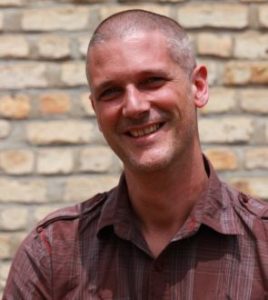Inspiring Staff Stories: Tom MacGregor, Co-Founder
What brought you to Rwanda?
My desire to work in Africa began the year before I went to university. I had joined Mercy Ships (a Christian medical relief organisation) as a deckhand while doing a discipleship training course. In that time, I visited a few countries in Africa, including Togo. I fell in love with the place. They say the red dust gets under your skin, but for me, there was just something about the place, the friendliness of the people that attracted me to the continent. After that I traveled around the states volunteering at ‘Camp America’, before going to university to study Business Management. I hadn’t really known what I wanted to do as a career, but after graduating, I found myself working in insurance. I passed the necessary exams and worked my way up.
Turning thirty was a turning point for me and I knew that things had to change. Working as an insurance broker just wasn’t the right fit for me; I wanted to do something that made more of an impact in the world in the way that I felt designed for. I googled ‘Africa’ and ‘business’, since I knew that senior management in development wasn’t really a route I wanted to go down; I wanted to work far more with the people that I would be serving. The connection to Rwanda came with a short-term mission trip that I went on with my church.
What gave you the idea for Azizi Life and how did it get off the ground?
I was volunteering with Food for the Hungry at the time working out of what is now the Azizi Life office in Muhanga. My role initially was to research businesses in the area, and so I ended up writing a lot of business plans and reports, some of which fed into the early work with Azizi. We were trying to see how we could circulate money back into the local economy – to keep it at the village level, rather than disappearing to Kigali. I visited local communities with some Food for the Hungry colleagues and saw that while many artisans were producing handicrafts, local people weren’t purchasing them. Also, the artisans weren’t making any profit from their craft, since people just paid for the raw materials.

Tom MacGregor (Photo Credit: Azizi Life)
With a capital injection from Food for the Hungry, we were able to start a handicraft social enterprise that paid the artisans a fair price to make it worth their while. Christi, an American colleague, and Jeannine, a Muhanga local and now CEO of Azizi Life, worked with me to build relationships with artisans and purchase their crafts. Although it was never the plan, we started exporting products to the States since we had some contacts there.
What is the greatest challenge of your role?
There are so many ideas to try, so choosing the right one at the right time is challenging. Another challenge is trying to make ends meet – making sure we can pay all our staff and artisans on time, meet our tax obligations, keep up with legal requirements and regulation. Many of our artisans don’t have too much in the way of savings, so if they don’t get paid on time for the purchase of their products, they don’t have much to fall back on. However, there has never been a time when we haven’t been able to achieve this. God has been so faithful.
What do you love about working with Azizi Life?
The work we do has evolved so much – Azizi Life Crafts, Azizi Experiences, the Azizi Life Studio, Beeutiful Creations. I love the change and variety, and that there are always new challenges – it’s exciting! We have the freedom and flexibility to be creative. When we started out I could not have imagined the shape that things would take. There are some things that we planned for and have achieved, including Rwandan ownership of the social enterprise, and branching out into a self-sustaining non-profit model, but other things have evolved over the years.
How has Azizi overcome challenges?
Prayer and people! Azizi Life Crafts wouldn’t be what it is without Sheila, Jeannine and Christi; Azizi Life Experiences wouldn’t be what it is without Jeannine and Gerry Skeens, a Brit who came back to Rwanda to volunteer with us after doing the VSO programme. I just try to encourage and motivate people to do what they are gifted in.
What is your vision for Azizi Life?
I would love to see multiple businesses benefiting local communities in a self-sustaining way.
With our American non-profit, Azizi Life US, we are focused on sales, marketing and growth, and in light of Azizi Life’s 10-year anniversary we have set a goal to multiply artisan incomes ten-fold by the end of 2022. More work for the artisans means increased income and more capital going back into the local economy of our artisans, as well as more money going into Azizi Life impact projects such as fuel-efficient stoves and the Adult Literacy Project. It’s my hope that Azizi Life US will be self-sustaining; at the moment, it is run by volunteers.
And finally, what have you learned about leadership?
When good things happen in your team, give the credit to them. When things go wrong, don’t pass the buck, but take responsibility and own it.




Leave a Reply
Want to join the discussion?Feel free to contribute!